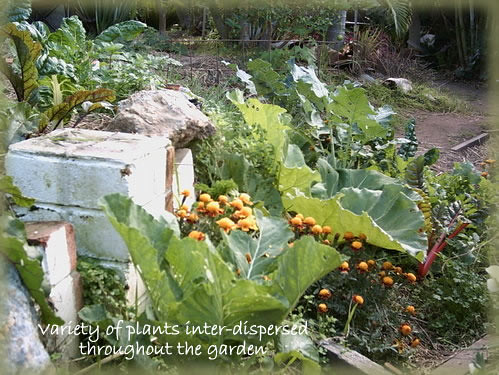 In my garden, my focus is almost totally on the soil. Natural gardening is about improving the soil, which in nature is a living, bio-diverse medium, full of micro organisms, worms, grubs and a perfect balance of moisture and food (ie manures composts organic matter) to sustain and maintain a healthy soil. This in turn produces healthy plants, which thrive in the environment you co-create with nature. Use of long term artificial chemicals, produce only short term gains, whereas in nature it is totally sustainable. Modern techniques are dependant on external energies such as fertilisers and pesticides which tend to attack nature rather than working with it. The soil, in this approach, is first mined of its fertility to produce food and, from then on, there is a dependency to use non renewable resources to support further yields which is not only costly, but is slowly killing our soils. This is to the benefit of the multinational companies who fool you into a false sense of security only for their gain and their shareholders.
In my garden, my focus is almost totally on the soil. Natural gardening is about improving the soil, which in nature is a living, bio-diverse medium, full of micro organisms, worms, grubs and a perfect balance of moisture and food (ie manures composts organic matter) to sustain and maintain a healthy soil. This in turn produces healthy plants, which thrive in the environment you co-create with nature. Use of long term artificial chemicals, produce only short term gains, whereas in nature it is totally sustainable. Modern techniques are dependant on external energies such as fertilisers and pesticides which tend to attack nature rather than working with it. The soil, in this approach, is first mined of its fertility to produce food and, from then on, there is a dependency to use non renewable resources to support further yields which is not only costly, but is slowly killing our soils. This is to the benefit of the multinational companies who fool you into a false sense of security only for their gain and their shareholders.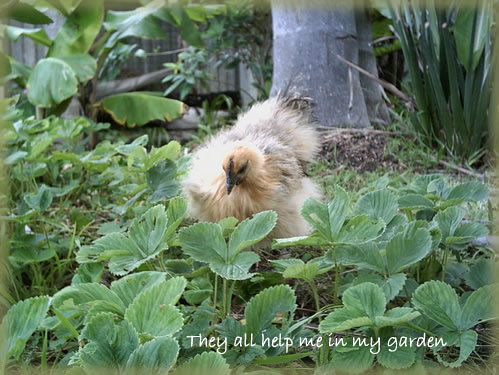 Working with nature, using organic, permaculture or natural techniques, takes into consideration all the cultures of the immediate environment of your garden – buildings, trees, animals, plants, water, sun, wind, people, insects, rodents, birds, plants, stones ….etc and looks into their inter-relatedness. This is working with nature in preference to being against it, finding ways these cultures can work or function co-operatively rather than seeing them as separate individual functions. I believe too that a vital asset to your garden is your intuition. This I see as nature itself speaking to your heart through the intimate relationship you build with it through your garden.
Working with nature, using organic, permaculture or natural techniques, takes into consideration all the cultures of the immediate environment of your garden – buildings, trees, animals, plants, water, sun, wind, people, insects, rodents, birds, plants, stones ….etc and looks into their inter-relatedness. This is working with nature in preference to being against it, finding ways these cultures can work or function co-operatively rather than seeing them as separate individual functions. I believe too that a vital asset to your garden is your intuition. This I see as nature itself speaking to your heart through the intimate relationship you build with it through your garden.
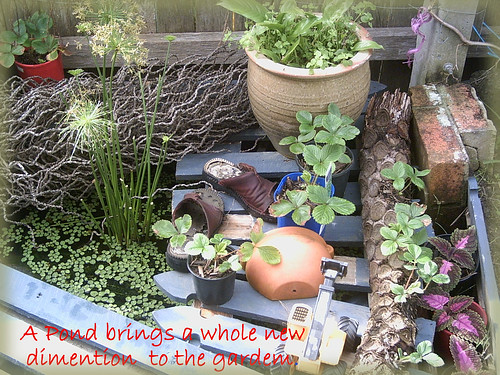 Crop rotation helps the health of your garden as does the inter-dispersion of flowers throughout the garden to attract bees. The use of compatible herbs and companion planting attract other insects and organisms, or repel those you do not want. I create environments within the garden, such as little nooks and crannies, to attract creatures like lizards and rodents to keep the population of things like snails in check. I have made a fish pond in the vegetable garden to encourage frogs to feed on insects that if over populated may decimate my crops. I keep Rabbits and chickens for manure and the straw I buy for their homes make great mulch which help to control weeds and maintain a good moisture level in the soil in summer while breaking down to improve the soil with their uric acids and nutrients.
Crop rotation helps the health of your garden as does the inter-dispersion of flowers throughout the garden to attract bees. The use of compatible herbs and companion planting attract other insects and organisms, or repel those you do not want. I create environments within the garden, such as little nooks and crannies, to attract creatures like lizards and rodents to keep the population of things like snails in check. I have made a fish pond in the vegetable garden to encourage frogs to feed on insects that if over populated may decimate my crops. I keep Rabbits and chickens for manure and the straw I buy for their homes make great mulch which help to control weeds and maintain a good moisture level in the soil in summer while breaking down to improve the soil with their uric acids and nutrients.
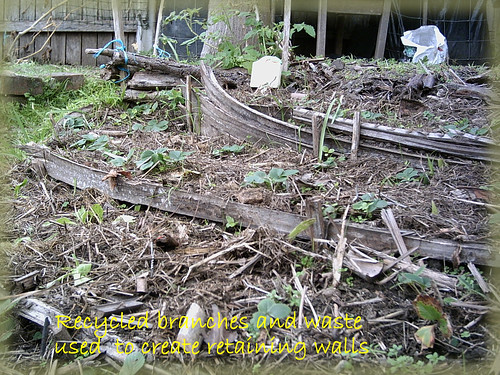 Recycling kitchen and garden waste in composts and using those pruned branches to create little retaining walls or place them in soil to impede the movement of the topsoils on inclines – they too over time break down leaving the nutrients and fibres needed to improve the condition of soil - plus of course help the world environment by not sending such things off to Land fill rubbish dumps. My garden soil is a seed bank too. I allow my strongest vegetables to go to seed instead of eating them. The seeds drop into the soil and appear as seedlings, in season, where the seeds lay. Some end up deep in the soil if I happen to dig the garden over and maybe a year or so later when I re dig they just pop up here and there. The seeds produced, genetically change over time and adapt over generations to the environment of my garden and build resistance to whatever detriments may be peculiar to my garden. Packet seeds from seed companies are adapted to other environments.
Recycling kitchen and garden waste in composts and using those pruned branches to create little retaining walls or place them in soil to impede the movement of the topsoils on inclines – they too over time break down leaving the nutrients and fibres needed to improve the condition of soil - plus of course help the world environment by not sending such things off to Land fill rubbish dumps. My garden soil is a seed bank too. I allow my strongest vegetables to go to seed instead of eating them. The seeds drop into the soil and appear as seedlings, in season, where the seeds lay. Some end up deep in the soil if I happen to dig the garden over and maybe a year or so later when I re dig they just pop up here and there. The seeds produced, genetically change over time and adapt over generations to the environment of my garden and build resistance to whatever detriments may be peculiar to my garden. Packet seeds from seed companies are adapted to other environments.
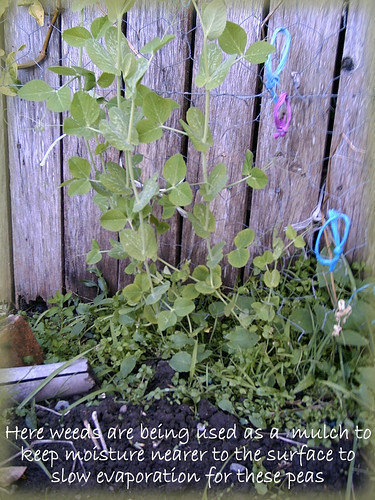 Weeds are also beneficial and not at all the scourge they are made out to be. I can use them as a sort of mulch to prevent evaporation in summer or as a way to recycle any nutrients that leech deep into the soil, unused. These are then captured by weeds with deep, penetrating tap roots, bringing the unused nutrients back up to their leaves and stems. So by lopping them before they seed I leave them to rot on the surface so the nutrients are then re-introduced to the topsoil. These are just some method ideas I use in my garden and over time I will devote blogs to each method independently. I will use and expand the concepts in photos and simple explanations to encourage you to start thinking and seeing how easy and enjoyable it is to grow your own. Even more so, that perhaps one day what I share here with you may help you through tough times in the future. For those of you who I know already use similar philosophies I hope you join in and co-blog or write your own experiences on subjects particular to your environment or focus
Weeds are also beneficial and not at all the scourge they are made out to be. I can use them as a sort of mulch to prevent evaporation in summer or as a way to recycle any nutrients that leech deep into the soil, unused. These are then captured by weeds with deep, penetrating tap roots, bringing the unused nutrients back up to their leaves and stems. So by lopping them before they seed I leave them to rot on the surface so the nutrients are then re-introduced to the topsoil. These are just some method ideas I use in my garden and over time I will devote blogs to each method independently. I will use and expand the concepts in photos and simple explanations to encourage you to start thinking and seeing how easy and enjoyable it is to grow your own. Even more so, that perhaps one day what I share here with you may help you through tough times in the future. For those of you who I know already use similar philosophies I hope you join in and co-blog or write your own experiences on subjects particular to your environment or focus
As always a great and informative blog, i will be looking forward to when you expand on your methods. I really like how you think about the environment and I also think it is vital that we try our darnest to use nature and not abuse it
ReplyDeleteVery interesting and I would be very much in your line of things, but have only really a smaller garden. I avoid any sort of artificial fertilisers or poisons against insects. I like to take photos of the insects and I have 3 cats that I do not want to get poisoned by the stuff. I even planted stinging nettles myself as I had none and I read they are good for the earth, as well as being a place for certain butterfly caterpillars. In Switzerland Winter is a quiet time in the garden and we have to grow our veg during the Spring to Autumn.
ReplyDeleteI think this is very interesting and love it that you grow things in your garden for the good of the insects and the soils. I would love to see some of your photos on them and how you invite them into your garden - perhaps words in a posting here. the group is about the garden and there are as many types of gardens as there people some are just pebbles!!
ReplyDelete